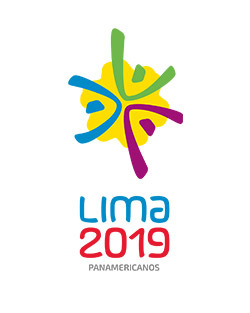On The Record with Slobodan Soro, Brazil Men’s Water Polo Goalie
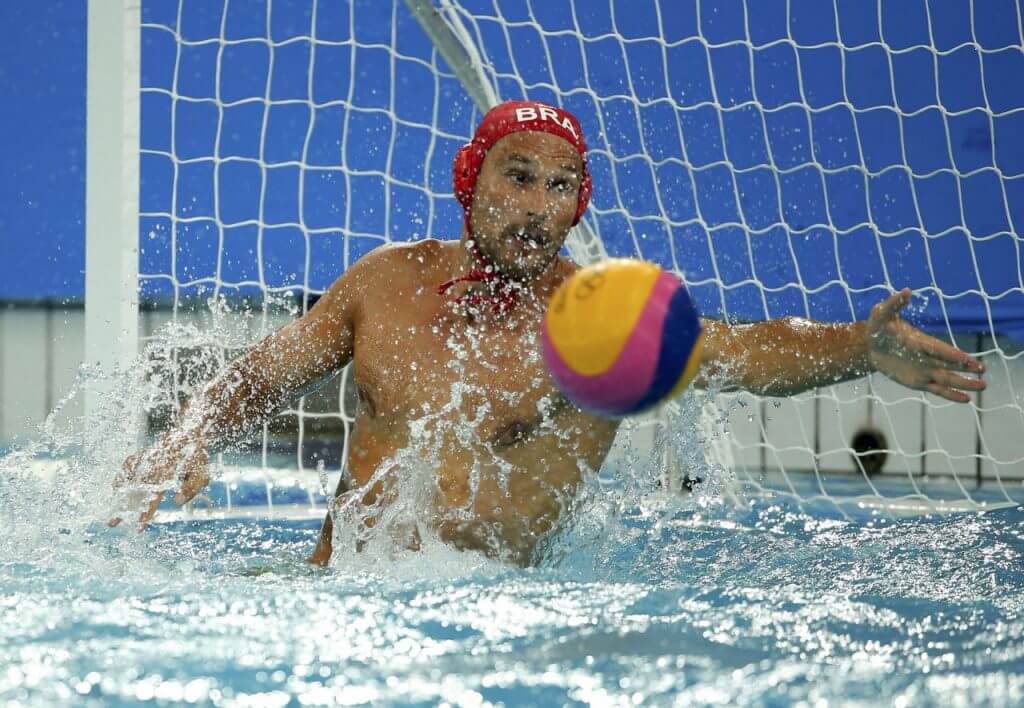
LIMA, PERU. It was one of the greatest upsets in Olympic men’s water polo history. Brazil—playing in the Olympics for the first time in 32 years—beat Serbia, the soon to be Gold medalists, in group play at the 2016 Rio Games. But this was no fluke for a team hosting the Olympics. Brazil, led by Ratko Rudic, featured a core of experienced players from Europe, that the all-time winningest coach in Olympic history was able to mold into a strong unit. Felipe Perrone and Josip Vrlic were essential components of that great effort to transform the sport in South America, but it was goalie Slobodan Soro, who had backstopped Serbia to bronze finishes in the 2008 and 2012 Olympics, who was the heart of that Brazilian team.
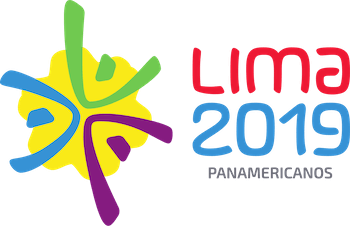 After a temarkable 8th place finish in Rio, Perrone went back to Spain while Vrlic returned to his native Croatia. Staying—and hoping to be part of a continued upswing for the sport in South America—was Soro, now captain of the squad coached by Ricardo Azevedo.
After a temarkable 8th place finish in Rio, Perrone went back to Spain while Vrlic returned to his native Croatia. Staying—and hoping to be part of a continued upswing for the sport in South America—was Soro, now captain of the squad coached by Ricardo Azevedo.
In in Lima, Brazil’s undefeated romp through inconsistent competition at the 2019 Pan American Games was unexpectedly ended by an upset loss to Canada. Falling behind early, the Brazilians rallied to take a one-goal lead with two minutes left—only to see the Canadians score two late goals and win 8-7.
[Canadians and Americans Will Meet in Both Women’s and Men’s Pan American Water Polo Final]
Swimming World caught up with Soro after his team captured Pan Am bronze with a 9-6 win over Argentina where he spoke about the loss to Canada, Brazil’s great leap forward at the 2016 Olympics and his future with the Brazilian national squad.
– This is a great platform for polo in the region and a wonderful opportunity for Brazil to shine.
You know my story about Serbia and now playing for Brazil [the last] four years. After the Olympic Games, I continue to play for Brazil, because this part of my life. I looked for a chance to do something for water polo. Now there’s almost nothing for me. In financial side, physically, mentally, there’s nothing. But I think I’m doing something; first for Brazilian water polo, and then for South America water polo, and in the end for the world water polo.
Next January it will be 30 years that I’m playing water polo. I’m enjoying doing this, and I exactly know where I am, who I am, and what can I do with these guys. We’re doing it to push harder. I really enjoy all of this.
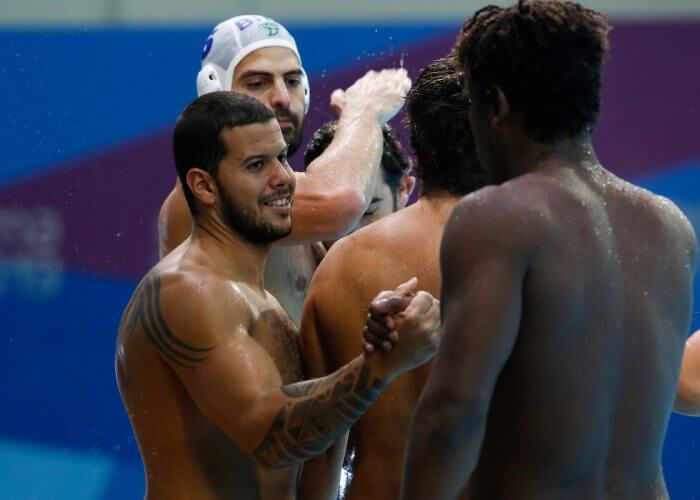
After semifinals loss, Brazil’s water polo team rebounds for bronze at Pan American Games. Photo Courtesy: Enrique Cuneo / Lima 2019
You see this tournament is a little strange because of different styles of water polo. Different teams I’ve never seen before, so it’s nice experience for me. I never played Pan American Games before. About us, losing semi-final is always hard, then to return next day and to win against the same team you won before, also a difficult thing.
In the end, what can I say about [loss to Canada]? After 7-6 for us, two minutes before the end, we needed to have first is concentration to finish game in the right way, and second thing is the experience.
[USA Men’s Water Polo At 2019 Pan American Games: Beware Brazil]
I don’t want to say we didn’t have luck because I don’t believe in luck in sports. Goal for 7-7 was shot from outside, ball was bounced from the hand, [to] go in, but the block was not in the right place.
It’s not that or good luck, the goal for losing the game and Canada winning was goal from two meters that’s something you shouldn’t allow in the last minute of the game. For me, it’s first lack of concentration and then lack of experience, that’s it.
– How do you see this beautiful pool, a Peruvian team playing for the first time, not ever, but for the first time in many, many years. How do you see your part of this and the sport continuing to grow, if that’s the case?
I see many people recognizing me, knowing who am I. Cheering me, taking photos with me, this is for me first thing. They are involved in the world water polo, they know who I am.
Second thing, to develop one sport, you need a lot of things. You need tradition. For water polo you need conditions, you cannot just go out and play water polo. You need swimming pools, you need installations, goals, you need many, many things. So this is our disadvantage, water polo is beautiful sport, and another bad thing for us, everything that goes under the water normal viewers cannot see. And it is the most interesting part of our sport.
So on, how we can change something [here]?
For me, it’s for them [my] advice is the same thing as Brazil did. They need to bring somebody from the outside from Europe, from U.S., from Australia, someone who’s above them with water polo skills, water polo knowledge, to show them, to teach them—because it’s the only way to grow up, to get better.
Watch the game we played against Puerto Rico in quarterfinal. The last minute, they enter with the goalkeeper tried to score. There was no goalkeeper on the other side. We take the ball, and I didn’t shoot at the empty goal because I respect their effort to give something more. For me, winning 15-4 or 15-5, doesn’t change nothing. I pass the ball to my guys and said: “Don’t shoot.” I respect them trying to do something more.
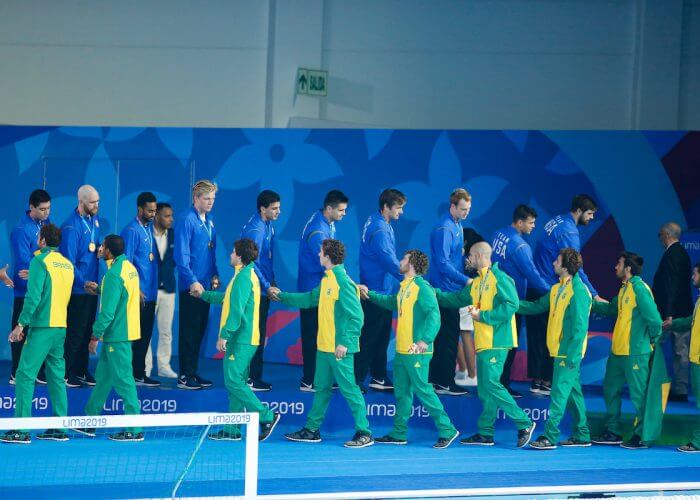
Gracious in defeat: Brazilians congratulate winning American side. Photo Courtesy: Enrique Cuneo / Lima 2019
It’s a good thing, I respect everybody’s work and effort to do whatever. But if you’re in the same point for many, many years, you have to change something. That happened with Brazil 2013-14, when they bring me and few other guys to make a good team for Olympic games, and this was the part when the Brazilian water polo start to grow up.
There were some more moments where they could do more. They missed chances after Olympic games, there were some problems in the Federation, there still are, but maybe I’m the person who can do more things with Brazilian water polo. This is how you can do. I don’t see any other way.
– In 2015 Brazil because made the bold move to bring in you, Felipe Perrone, Josip Vrlić and Ratko Rudic to change the culture of polo.
There is always our base in Rio and Sao Paolo. These are two huge cities, two huge places with lot of people. Rio and Sao Paolo together have 37 million people. Serbia has less than seven [million].
You can make many more things but you have to change mentality of people, you have to change how they work from the beginning with the young guys, change the culture of water polo. They have this, it’s not Latino style, Brazil is different.
They’re too big, and they’re alone from themselves. They don’t care nothing with that, no connections with other countries. They have their own culture, I want to say lifestyle, and so many things. They like to play, to train, to have fun. They give really good energy every game, and they are really big fighters with a big heart, but the problem is that they don’t have the base. They don’t like to train, they don’t like to work, everything goes easy.
If we somehow manage to change this base, I think they can do much more.
– It sounds like you’re committed to helping Brazil water polo.
Now I’m just a player, the captain of the team. I still don’t know if I’m going to continue playing. I have some offers, but none of them is good for me. So, maybe some other position, maybe as a coach.
Everything depends on them. I would like to help them more, but they need to do something more for me because I’m guy with a family. My family lives in Belgrade, and to change all my life, I have to have a good situation. I have to know the whole conditions, I need to get them in the right way. They have to be fulfilled.




